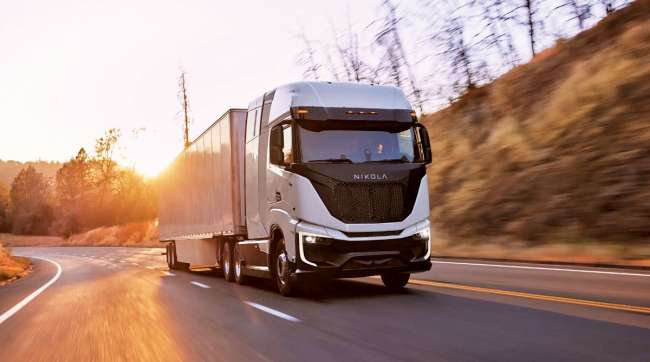Staff Reporter
Nikola Reports Q2 Shortfall but FCEV Sales Grow

[Stay on top of transportation news: Get TTNews in your inbox.]
Nikola Corp. reported a 103% revenue increase but wider losses in the second quarter as electric vehicle sales gained momentum, the company announced Aug. 9.
The Phoenix-based manufacturer posted a net loss of $133.7 million, or $2.86 per diluted share, for the three months ending June 30. That compared with a loss of $217.8 million, $5.93, in the same period last year. Total revenue rose to $31.3 million from $15.4 million.
“In the last three quarters of serial production, we have demonstrated that Nikola is the offtake," Nikola CEO Steve Girsky said. “We are the only OEM with Class 8 FCEVs commercially available in North America today. Our trucks are put to the test every day by end fleet users, hauling freight and delivering to their customers. Q2 is an example of how we’re approaching the intersection of mission and reality and how Nikola is out front, charting the course.”
Nikola reported delivering 72 hydrogen fuel cell electric vehicles to dealerships in Q2, exceeding the high end of its guidance range. This brings its total to 147 wholesaled FCEVs in the first three quarters of serial production.
The earnings report highlighted notable Q2 customer wins, including Walmart Canada’s introduction of an FCEV semi-truck to its fleet. Nikola also received repeat orders from two national accounts, which the company believes signals growing profitability momentum.
Nikola continued efforts to deliver its fueling solutions system to support volume ramp-up. The company is launching stations and deploying assets where demand is anticipated, focusing on staying ahead of FCEV deployment, particularly in California and Canada.
The company reported maintaining a dominant share of Zero-Emission Truck and Bus Voucher Incentive Project (HVIP) vouchers in California. By quarter’s end, it held 99% of FCEV and 23% of battery-electric vehicle HVIP vouchers. Nikola also created alternative revenue streams from regulatory credit sales.
Baird Equity Research noted in a report that quarterly revenue was helped by the average selling price increasing sequentially as the company ramped capacity to meet the growing demand for its FCEVs.
Jeff Loftus of FMCSA joins TT’s Seth Clevenger to discuss the current outlook on ADAS technology and how it will affect the industry at large. Tune in above or by going to RoadSigns.ttnews.com.
“The build-out of its hydrogen fueling network continues toward the goal of 14 stations by year-end (seven YTD), which we see as a key to driving adoption,” Baird analyst Ben Kallo wrote in the report. “Cash burn and liquidity position remain key questions for 2H, and we note that Nikola has several options, such as grants/incentives, monetizing noncore assets and opportunistic capital markets opportunity.”
Baird views longhaul trucking as one of the best use cases for hydrogen and expects the market will expand as fleets, states and other parties work toward their emissions goals. The financial services firm believes Nikola has a first-mover advantage with the market still just starting to come into existence.
Want more news? Listen to today's daily briefing below or go here for more info:





